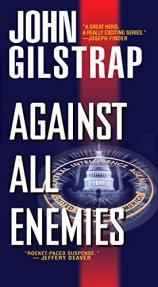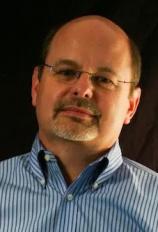Interview: July 1, 2015
John Gilstrap’s novels read like blockbuster movies, sort of a cross between Midnight Express and Black Hawk Down. Sure enough, he has signed contracts for three screenplays (more details here.) Gilstrap --- whose latest book, AGAINST ALL ENEMIES, is his seventh thriller featuring hostage rescue specialist Jonathan Grave --- chats with Bookreporter.com’s Dean Murphy about the psyche of his protagonist, the craft of writing, his life as an author, and the power of the written word.
Bookreporter.com: AGAINST ALL ENEMIES varies from the hostage rescue theme. Why the change?
John Gilstrap: The Grave series has never been about hostage rescue, per se, but about a team of deeply good people who are capable of brutal violence when necessary to serve a larger cause. As Jonathan has said more than once, he considers himself to be “on the side of the angels,” doing the kinds of tasks that need to be done, but never can be done inside the boundaries of the law.
BRC: AGAINST ALL ENEMIES has more of a political theme, though there’s intense action in Afghanistan, Panama and West Virginia. What are the chances of similar home-grown terrorism in the US?
JG: I was invited to a closed conference of law enforcement officers a few months ago where the topic was the challenge of dealing with the 500+ known terror cells in the United States. I confess I was startled to learn that within 10 miles of my house, there are Al Qaeda and Hezbollah cells. The various alphabet agencies do what they can to keep an eye on them, but it’s not a crime merely to think bad thoughts and hang around with bad people, so no arrests are made. Throw in the fact that those experts estimate 15–20% of undocumented aliens flowing across the borders are miscreants of some sort --- lots of gang members, I’m told --- and it’s hard to imagine that bad things don’t lie ahead. The good guys have to be right 100% of the time to prevent attacks. The bad guys only have to be right once.
Regarding home-grown terrorism, there’s a lot of anger out there in society these days. Even a casual tour of Facebook or a quick perusal of the comments following a story in any newspaper will show just how spit-throwing angry people are. Even on Capitol Hill, it’s not enough to disagree; one must demonize one’s opposition, render them untouchable. In the political arena, civil discourse is hard to find. If issues cannot be discussed rationally, I don’t think it’s that far a step for like-minded people to form groups bent on using violence to get its way.
Before moving on, I want to specifically address the politics part of your question. Over the course of the Grave series, I’ve been hammered by left-leaning readers and right-leaning readers because of the politics they perceive to be in my books, which means I’m doing a pretty good job of finding the sweet spot. Fact is, I don’t write politics, I write fiction. I think it’s unfair for authors of popular fiction to use stories as a means of inflicting their politics on readers, if only because there’s no practical way for readers to respond. Do I use current troubles to trigger events in my novels? Of course. But none of my characters --- President Darmond, in particular --- is an avatar for any real person.
BRC: Jonathan Grave is complex. Please tell us more about his psyche and motivations.
JG: Jonathan Grave has a very long story arc in my head --- one that I hope to have the opportunity to play out over many more books. Even “my” newsletter to readers is written in Jonathan’s voice about Jonathan’s world. His psyche and motivations are part of that developing arc. I think that Jonathan just wants the world to be a better place. He despises bullying in all of its forms, and more than anything he despises bullshit. He is intensely loyal to those who earn it, and he inspires intense loyalty from people around him.
BRC: Some of Jonathan’s Black Ops team cross indelible lines. How does he cope with things he can’t control?
JG: He compartmentalizes, accepts the uncontrollable as just that --- uncontrollable. Over the course of his career --- both on the page and beyond it --- Jonathan has killed many dozens of people, but he has never assassinated anyone. Never murdered anyone. The fact that a jury, if given the opportunity, might disagree wouldn’t change his mind a bit. He expects the people on his team to follow the same set of rules as he, and when they don’t he banishes them from his inner circle.
BRC: Jonathan Grave and John Gilstrap share the same initials.What else do they have in common?
JG: True story: I was well into the third book in the Grave series before I became consciously aware that Grave and I share initials. A fan pointed it out to me at a book signing. Who knew?
But you ask an interesting question. What do I share with the other JG? We both like Beefeater martinis and Lagavulin Scotch whisky. We both share a miniscule tolerance for bullshit and zero tolerance for dishonesty. At some level, I think we both see the world as an irredeemably dark place that is populated largely by liars and thieves, but we never give up the fight to find what’s good in it and to focus on that as much as possible. I am likewise intensely loyal to my friends and family and business relationships, and utterly dismissive of people who lie, cheat or steal.
BRC: You quit your day job --- again. In addition to continuing the Grave series, will you fill the time adapting your novels for film? Which of the Grave series will be the first?
JG: To date, no one has optioned the Grave series, so there’s nothing yet to write. Even if they are picked up, though, I’m not sure that I would want to write the screenplays. I enjoy writing screenplays, and would jump at the chance to adapt some of my early stand-alones, but a series needs to continually move forward in my head. I think my brain might explode if I tried looking forward and backward at the same time. If film producers are reading this, please pay attention: I think the Grave series would make a far better cable television series than feature film.
BRC: Your career venues varied as much as your plot twists. How did being a firefighter, EMT and explosives safety expert mold Jonathan?
JG: Wow. In every conceivable way. Firefighting in particular molded me into who I am today. Think about it. When I was only 23 years old, I was walking into the worst moments in people’s lives and it was my responsibility to bring order to chaos. I did that thousands of times over the course of 15 years. I saw terrible things, but I also delivered two babies. I dealt with grieving parents and grieving children --- occasionally at the same time. I’ve made remarkable saves, and I’ve made a couple of decisions that probably killed people. You do the best you can with what you’ve got, in the time you have it, and you move on. Those years were the closest I’ve ever been to being at war, and in that crucible of life-and-death decisions, I experienced the comradery that is unique to teams who share such circumstances. I draw on that a great deal for shaping Jonathan’s character.
On one fire call, early in my career, I was on the first arriving engine company at an apartment fire, and it looked like the whole world was burning. There are about a bazillion decisions that have to be made in the first seconds of an incident like that, and my lieutenant (thank God I was not in charge!) pulled the cigar out of his mouth, planted his fists on his hips and said, “Well, shit. We are 9-1-1.” Translation: Somebody’s got to tame this dragon, and we’re elected. Go to work.
Jonathan doesn’t crave the missions he takes on, but once it’s his job, there’s no backup to call. He just does what he has to do to succeed.
BRC: Please describe your typical day as an author.
JG: As you mentioned above, I quit my day job to write full time, and while it’s been six months, I’m still trying to figure out the schedule that works for me. More often than not, I wake around 9:00 (I am not a “morning person”), get to my desk around 10 and take care of administrivia (Facebook, email, etc.), and I’m usually writing away around noon. But it’s not straight time, and that’s part of what I’m struggling with. There are many more distractions working out of the house than in an office, and I have the attention span of a 10-year-old. I usually go to the grocery store around 4:00 to beat the commuter crowds, get back home for another hour or so at the keyboard, and then I make dinner. I rarely write at night anymore. That’s the time for reading or watching the tube.
BRC: You attend conferences and book signings. How do you manage time to write?
JG: There are a lot of hours in any given day. In July, I’ll be at ThrillerFest in NYC, where my days will be largely free (the real business is conducted at the bar, at night), so I’ll write in my hotel room. The good thing about being a writer is that you can do it pretty much anywhere. I actually write significant portions of my manuscripts by hand, in a notebook. Finding the time has just never been a problem --- probably training from those day job years!
BRC: Thank you for sharing. Any final thoughts?
JG: I hope that readers understand what an honor it is to be invited into their imaginations, if even for a few hours a couple of times a year. I don’t take any of that for granted. I am aware every hour of every day what a blessed life I lead, being allowed to make a living doing what I love most to do. Thank you!




